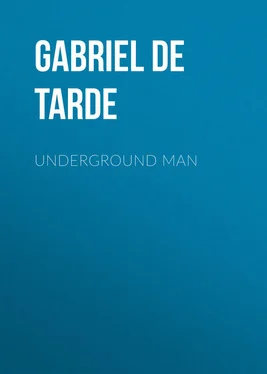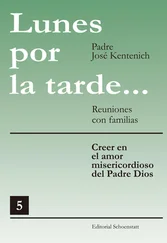Gabriel de Tarde - Underground Man
Здесь есть возможность читать онлайн «Gabriel de Tarde - Underground Man» — ознакомительный отрывок электронной книги совершенно бесплатно, а после прочтения отрывка купить полную версию. В некоторых случаях можно слушать аудио, скачать через торрент в формате fb2 и присутствует краткое содержание. Жанр: foreign_antique, foreign_prose, на английском языке. Описание произведения, (предисловие) а так же отзывы посетителей доступны на портале библиотеки ЛибКат.
- Название:Underground Man
- Автор:
- Жанр:
- Год:неизвестен
- ISBN:нет данных
- Рейтинг книги:4 / 5. Голосов: 1
-
Избранное:Добавить в избранное
- Отзывы:
-
Ваша оценка:
- 80
- 1
- 2
- 3
- 4
- 5
Underground Man: краткое содержание, описание и аннотация
Предлагаем к чтению аннотацию, описание, краткое содержание или предисловие (зависит от того, что написал сам автор книги «Underground Man»). Если вы не нашли необходимую информацию о книге — напишите в комментариях, мы постараемся отыскать её.
Underground Man — читать онлайн ознакомительный отрывок
Ниже представлен текст книги, разбитый по страницам. Система сохранения места последней прочитанной страницы, позволяет с удобством читать онлайн бесплатно книгу «Underground Man», без необходимости каждый раз заново искать на чём Вы остановились. Поставьте закладку, и сможете в любой момент перейти на страницу, на которой закончили чтение.
Интервал:
Закладка:
It was not merely a simple means of diversion for the cultured. The masses took their share in it with enthusiasm. Certainly they now had leisure to read and appreciate the masterpieces of art. The transmission of force at a distance by electricity, and its enlistment under a thousand forms, for instance, in that of cylinders of compressed air, which could be easily carried from place to place, had reduced manual labour to a mere nothing. The waterfalls, the winds and the tides had become the slaves of man, as steam had once been in the remote ages and in an infinitely less degree. Intelligently distributed and turned to account by means of improved machines, as simple as they were ingenious, this enormous energy freely furnished by nature had long rendered superfluous every kind of domestic servant and the greater number of artisans. The voluntary workmen, who still existed, spent barely three hours a day in the international factories, magnificent co-operative workshops, in which the productivity of human energy, multiplied tenfold, and even a hundredfold, surpassed the expectations of their founders.
This does not mean that the social problem had been thereby solved. In default of want, it is true, there were no longer any quarrels; wealth or a competence had become the lot of every man, with the result that hardly anyone henceforth set any store by them. In default of ugliness, also, love was scarcely an object of either appreciation or jealousy, owing to the abundance of pretty women and handsome men who were as common as blackberries and not difficult to please, in appearance at least. Thus expelled from its two former principal paths, human desire rushed with all its might towards the only field which remained open to it, the conquest of political power, which grew vaster every day owing to the progress of socialistic centralisation. Overflowing ambition, swollen all at once with all the evil passions pouring into it alone, with the covetousness, lust, envious hunger, and hungry envy of preceding ages, reached at that time an appalling height. It was a struggle as to who should make himself master of that summum bonum , the State; as to who should make the omnipotence and omniscience of the Universal State minister to the realisation of his personal programme or his humanitarian dreams. The result was not, as had been prophesied, a vast democratic republic. Such an immense outburst of pride could not fail to set up a new throne, the highest, the mightiest, the most glorious that has ever been. Besides, inasmuch as the population of the Single State was reckoned by thousands of millions, universal suffrage had become impracticable and illusory. To obviate the greater inconvenience of deliberative assemblies, ten or a hundred times too numerous, it had been found necessary so to increase the electoral districts that each deputy represented at least ten million electors. That is not surprising if one reflects that it was the first time that the very simple idea had won acceptance of extending to women and children the right of voting exercised in their name, naturally enough, by their father or by their lawful or natural husband. Incidentally one may note that this salutary and necessary reform, as much in accordance with common sense as with logic, required alike by the principle of national sovereignty and by the needs of social stability, nearly failed to pass, incredible as it may seem, in the face of a coalition of celibate electors.
Tradition informs us that the bill relating to this indispensable extension of the franchise would have been infallibly rejected, if, luckily, the recent election of a multi-millionaire suspected of imperialistic tendencies had not scared the assembly. It fancied it would injure the popularity of this ambitious pretender by hastening to welcome this proposal in which it only saw one thing, that is, that the fathers and husbands, outraged or alarmed by the gallantries of the new Cæsar, would be all the stronger for impeding his triumphant march. But this expectation was, it appears, unrealised.
Whatever may be the truth of this legend, it is certain that, owing to the enlargement of the electoral districts, combined with the suppression of the electoral privileges, the election of a deputy was a veritable coronation, and ordinarily produced in the elect a species of megalomania. This reconstituted feudalism was bound to end in a reconstitution of monarchy. For a moment the learned wore this cosmic crown, following the prophecy of an ancient philosopher, but they did not keep it. The popularisation of knowledge through innumerable schools had made science as common an object as a charming woman or an elegant suite of furniture. It had been extraordinarily simplified by the thorough way in which it had been worked out, complete as regards its general outlines, in which no change could be expected, and its henceforth rigid classification abundantly garnished with data. Only advancing at an imperceptible pace, it held, in short, but an insignificant place in the background of the brain, in which it simply replaced the catechism of former days. The bulk of intellectual energy was therefore to be found in another direction, as were also its glory and prestige. Already the scientific bodies, venerable in their antiquity, began, alas! to acquire a slight tinge and veneer of ridicule, which raised a smile and recalled the synods of bonzes or ecclesiastical conferences, such as are represented in very ancient pictures. It is, therefore, not surprising that this first dynasty of imperial physicists and geometricians, genial copies of the Antonines, were promptly succeeded by a dynasty of artists who had deserted art to wield the sceptre, as they lately had wielded the bow, the roughing chisel, and the brush. The most famous of all, a man possessed of an overflowing imagination which was yet well under control, and ministered to by an unparalleled energy, was an architect who among other gigantic projects formed the idea of rasing to the ground his capital, Constantinople, in order to rebuild it elsewhere, on the site of ancient Babylon, which for three thousand years had been a desert – a truly luminous idea. In this incomparable plain of Chaldea watered by a second Nile there was another still more beautiful and fertile Egypt awaiting resurrection and metamorphosis, an infinite expanse extending as far as the eye could see, to be covered with striking public buildings constructed with magical speed, with a teeming and throbbing population, with golden harvests beneath a sky of changeless blue, with an iron net-work of railways radiating from the town of Nebuchadnesor to the furthest ends of Europe, Africa and Asia, and crossing the Himalayas, the Caucasus, and the Sahara. The stored energy, electrically conveyed, of a hundred Abyssinian waterfalls, and of, I do not know, how many cyclones, hardly sufficed to transport from the mountains of Armenia the necessary stone, wood and iron for these numerous constructions. One day an excursion train, composed of a thousand and one carriages, having passed too close to the electric cable at the moment when the current was at its maximum, was destroyed and reduced to ashes in the twinkling of an eye. None the less Babylon, the proud city of muddy clay, with its paltry splendours of unbaked and painted brick, found itself rebuilt in marble and granite, to the utmost confusion of the Nabopolassars, the Belshazzars, the Cyruses, and the Alexanders. It is needless to add that the archæologists made on this occasion the most priceless discoveries, in the several successive strata, of Babylonian and Assyrian antiquities. The mania for Assyriology went so far that every sculptor's studio, the palaces, and even the King's armorial bearings were invaded by winged bulls with human heads, just as formerly the museums were full of cupids or cherubims, "with their cravat-like wings". Certain school books for primary schools were actually printed in cuneiform characters in order to enhance their authority over the youthful imagination.
Читать дальшеИнтервал:
Закладка:
Похожие книги на «Underground Man»
Представляем Вашему вниманию похожие книги на «Underground Man» списком для выбора. Мы отобрали схожую по названию и смыслу литературу в надежде предоставить читателям больше вариантов отыскать новые, интересные, ещё непрочитанные произведения.
Обсуждение, отзывы о книге «Underground Man» и просто собственные мнения читателей. Оставьте ваши комментарии, напишите, что Вы думаете о произведении, его смысле или главных героях. Укажите что конкретно понравилось, а что нет, и почему Вы так считаете.












